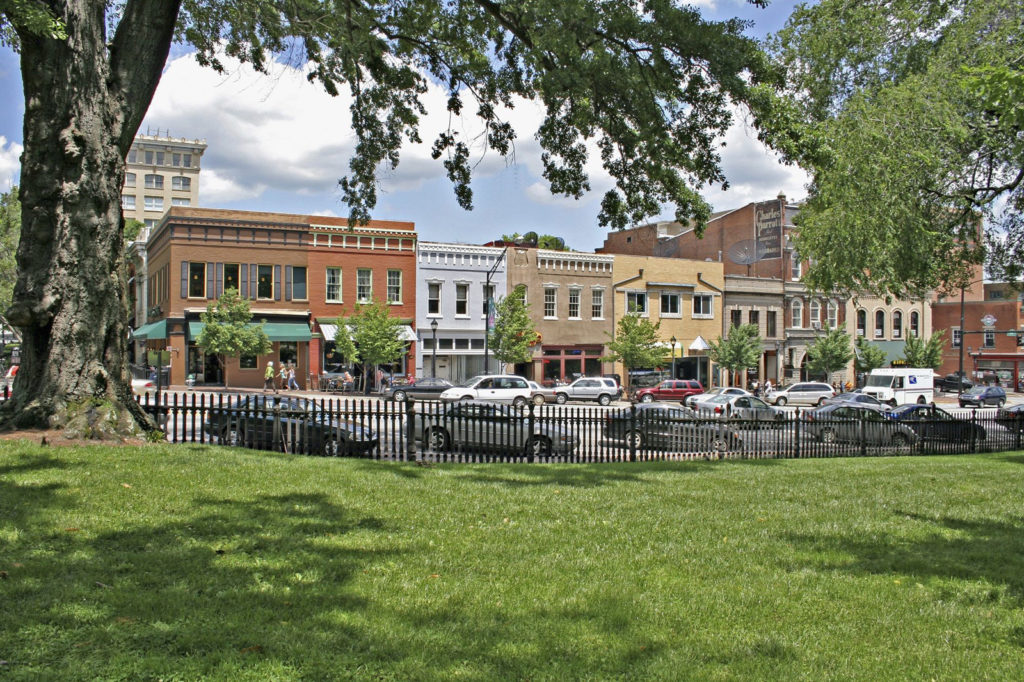Athens, Georgia, home to the University of Georgia, is located in Northeast Georgia on the rolling hills of the Piedmont. The town of Athens is known as the “Classic City” because of its culture and diversity. Athens was founded by committee in 1785 by the state legislature to endow the first state chartered public college in the United States. As a result the University of Georgia describes itself as the ‘birthplace of the American system of higher education.”
It wasn’t until 1801 that the legislature dispatched a committee led by John Milledge, who was a close friend of Thomas Jefferson, to find a site for the University of Georgia. While searching for a site the party encountered Daniel Easley, a land speculator and settler, who owned a mill on the Oconee River at Cedar Shoals. Easley showed them some property high on a hill above the shoals and it was there that John Milledge purchased 633 acres for $4,000 and donated the land to the trustees of the University of Georgia.
In the early 19th century the first class of the University had graduated in 1804 and the decades to follow Athens had become a cultural center of Northeast Georgia. With all the cotton grown in Georgia, Athens became a major textile production center coming from all the plantations in the area. The town consisted of professors, mill owners, business owners and aristocrats who moved to Athens to send their children to the University of Georgia. During this time there was a boom in building Antebellum homes like the Taylor/Grady home and the Ross Crane home on Prince Avenue, where a Fraternity took up residence. A wealthy plantation owner John Addison Cobb created Athens’ first neighborhood called Cobbham. Another historic landmark home is the octagon house built in 1842 known as the T.R.R. Cobb House. T.R.R. Cobb founded the Lucy Cobb Institute and was a girl’s school on Milledge Avenue named after his daughter Lucy.
Brigadier General R. R. Cobb wrote the Confederate Constitution and was a casualty of the Civil War. No battles were fought in Athens during the war except for a few skirmishes outside the city limits. A textile company converted their mill to make rifles and cannons. Athens’ double barreled cannon is the only one of its kind and can be seen at City Hall. Athenians lost 300 men to the war and even the University of Georgia closed during the Civil War.

After the Civil War the University of Georgia opened again in 1866 and with men coming home from the war attendance grew to its highest with 299 students. Athens became the county seat of Clarke County in 1872 and the first street car was introduced in 1880. In 1891 the State Normal School for women opened in what is now called Normaltown.
In the 20th Century Athens grew rapidly during and after World War II and many new establishments were built in downtown Athens. The population of Athens doubled in the early 20th century and the skyline of Athens changed as well. Buildings designed by Ten Eyck Brown included The Georgian and the next door courthouse. Margaret Mitchell stayed at The Georgian when it was hotel, but now has been converted to gorgeous condominiums with marble and stain glass. The Georgian is today a highly sought after property in Athens. Ben Epps, a Georgia aviation pioneer and friend of the Wright Brothers built his own plane and took flight as the 1st Georgian to fly an airplane The Athens airport is call the Athens-Ben Epps Airport. Philanthropist George Peabody endowed the city with a library and the Peabody Awards for excellence in journalism is named after him and administered by the University of Georgia. Monroe B. “Pink” a local real estate agent and politician became the 2nd black postmaster built the Morton Theater at what was called the “Hot Corner” in 1910. This became a cultural spot for the black community and is only one of four black vaudeville theatres remaining in the country.

In the later part of the 20th century Athens became a haven for musicians and artists. Many famous bands got their start playing Athens; the B-52’s, REM, Pylon, Love Tractor, Widespread Panic, The Black Crowe’s, Drive-By Truckers
and many more. The famous venues bands play are the legendary 40 Watt, Georgia Theatre, Classic Center and the old Uptown Lounge. Athens is a mid-sized town with a lot to do
Athens hosted women’s soccer and gymnastics for the 1996 Atlanta Summer Olympics. Downtown the Classic Center was built for concerts, Broadway shows and conferences. The University’s Georgia Museum of Art holds many pieces of fine art and curates exhibits from great artists from around the world. The 313-acre Botanical Gardens hosts Georgia’s Garden Club. The Botanical Gardens hosts many events during the year and has wonderful trails to walk. Athens even has a tree that owns itself. The first telling of the story was in the Athens Weekly Banner on August 12, 1890 and was a front page story telling how Colonel William Henry Jackson had deeded the tree to itself. The original tree started life between the 16th and 18th century and was the most famous tree in the United States. It fell on October 9, 1942. The current tree standing at the corner of South Finley (only Cobblestone St. left in Athens) and Dearing Street is the “Son of the Tree that Owns Itself”. An acorn from the first tree was grown and the sapling planted in the original trees location.
Today Athens downtown area is going through a boom time of building as student housing is being built near downtown and North Campus. Athens, GA is often named the best place to live in the United States. It was named by Forbes as the #1 place in the country to retire. Outside magazine ranked the Classic City as the sixth-best place to live in America, using criteria such as top spots in the country to work, run, eat, drink, paddle, ride and climb to determine the 16 finalists for the annual list. The magazine cited Athens’ “SEC football, robust party scene, and cycling on endless farm roads” as well as its “world-class eateries that combine the best of the South with an adventurous, farm-fresh ethos” for inclusion in the top 16.” In Athens you are still only 1 hour from Atlanta and the busiest airport in the world. Combining the University, sports, the arts, the food and much more you have all of what a large city has, but that small town feel.
